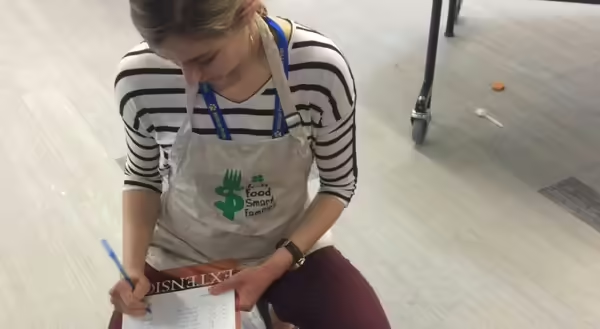
Wasted food has been a great challenge at many schools across Illinois. The mantra “It is not nutrition unless it is eaten” is espoused by many school nutrition staff trying their best to ensure students actually consume a nutritious and delicious school meal. SNAP-Education Educator Kaitlyn Streitmatter worked with Beverly Manor Junior High in Washington to research and apply ways to reduce school food waste and increase the amount of healthy foods students eat.
Food thrown away is wasted nutrients, money, time, and resources. Understanding what is wasted and why can help us develop strategies to reduce food waste. Plate waste audits help us do exactly that.
Beverly Manor Junior High expressed concern from staff, students, and parents regarding the large amount of food thrown away at lunch. When Kaitlyn was approached with this issue she suggested a plate waste audit. After assessing the needs of the school, a plan of action was established to conduct an audit and physically measure the food waste in order to determine the best policy change.
The first audit was conducted on a day the school served a popular meal of pizza bread, pineapple, and green beans. Extension staff’s research determined a total of 107.74 lbs. (27%) of school-food served ended up as waste.
Food Service Director Joan Wood and Kaitlyn decided to implement the “Offer vs. Serve” approach to help encourage students to consume their food and divert plate waste. Implementing “Offer vs. Serve” policy would no longer require students to take all five components of the school lunch. Students would choose a minimum of three components one has to be a fruit or vegetable. Although students were could choose all five components, it was no longer a requirement. The policy encouraged consumption and prevented food from being wasted.
To ensure successful implementation, Kaitlyn conducted two trainings for school staff. This allowed the staff an opportunity to present questions and concerns regarding the change. Other technical assistance such as extra signage was provided to help streamline the policy implementation. School staff, as well as students, were also trained for the new policy implementation.
The policy change was originally implemented in 8th grade, but due to its success, it was adopted across the entire school. After implementing the new policy, a second plate waste audit of the same menu was conducted and showed a vast improvement of waste diverted. The total food waste dropped to 53 lbs (12.7%) across the 400 students in grades 4th through 8th.
This vast difference impacts the school’s bottom line which in turn allows the school to better serve the students. The food service director is encouraged to eventually implement the policy change at the elementary level. With this motivation, the school has taken steps to encourage consumption of reimbursable meals by adding a flavor station and including students in the meal planning process.
MEET THE AUTHOR
As a SNAP-Education Extension Educator through Illinois Nutrition Education Programs (INEP) serving Fulton, Mason, Peoria and Tazewell counties, Kaitlyn Streitmatter provides evidence-based nutrition and physical activity education to low resource families in a variety of community settings. SNAP-Ed evidenced-based programs focus on nutrition education and obesity prevention through promoting behavior change. Kaitlyn works to provide professional development opportunities and hand-on assistance with policy and system change. Kaitlyn works in collaboration with local partners such as food pantries, schools, child care programs and other community agencies in an effort to build healthier communities.
Kaitlyn received her Bachelor of Science degree in Community Health from University of Illinois. Following her undergraduate degree Kaitlyn earner a Master’s of Science degree in Kinesiology at Southern Illinois, Edwardsville and a Graduate Certificate in Community Health Education from the University of Illinois. Kaitlyn is also a Certified Health Education Specialist.
ABOUT EXTENSION SNAPSHOTS
Extension Snapshots are monthly impact reports that share the stories of our programs in Fulton, Mason, Peoria, and Tazewell counties. To have them delivered to you directly sign up using our E-blast registration.